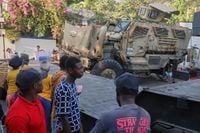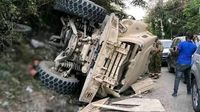On Sunday evening, August 31, 2025, tragedy struck on the outskirts of Port-au-Prince, Haiti, as a recovery operation involving two armored vehicles ended in a deadly accident. The incident, which took place along the Kenscoff-Pétion-Ville route in the Pèlerin 9 area, left three people dead, including a Kenyan police officer and two civilians, and injured eight other Kenyan officers. The events have cast a somber shadow over the United Nations-backed Multinational Security Support (MSS) mission, led by Kenya, which has been working to restore order in Haiti’s increasingly volatile capital.
According to a statement from the mission’s spokesman, Jack Ombaka, the accident occurred around 5:00 p.m. local time during a recovery operation. Two MaxxPro armored vehicles were involved: one was towing the other, which had broken down, when mechanical problems led to the crash. Ombaka explained, “Eight MSS officers sustained injuries, three of the injured are in serious condition and require medical evacuation to the Dominican Republic for specialized treatment after initial care at the Aspen Level 2 Hospital at the LSA 2.” Both the Kenyan officer and a civilian were pronounced dead after being rushed to Lambert Santé Hospital in Pétion-Ville.
The National Police Service (NPS) of Kenya quickly confirmed the facts, stating, “Reports indicate that on Sunday, 31st August 2025, at approximately 1700 hours Haitian time, MSS officers were involved in a tragic road traffic accident on the Kenscoff-Pétion-Ville Road in the Pèlerin 9 area. The incident occurred during a recovery operation involving two MaxxPro vehicles. During the towing process, the unfortunate accident happened, which also claimed the lives of two civilians and injured eight other MSS officers.” The NPS further expressed its condolences, adding, “The National Police Service extends its deepest and most heartfelt condolences to the family, friends, and relatives of the fallen officer and assures them of our unwavering support during this time of profound sorrow.”
Of the eight injured Kenyan police officers, three were in serious condition and required immediate airlift to the neighboring Dominican Republic for advanced medical treatment. The remaining injured officers received care in Haiti, and authorities have assured the public that all necessary steps are being taken to ensure their recovery. The MSS, in collaboration with the Haitian National Police (HNP), is making arrangements to repatriate the deceased officer’s body to Kenya, and the next of kin have been notified.
This fatal incident brings the total number of Kenyan police officers killed in Haiti since the MSS mission began over a year ago to three. One officer was previously killed in a gang attack, and another remains missing and is presumed dead. The mission itself, initiated to help quell rampant gang violence and stabilize the country, has faced significant challenges from the outset.
Port-au-Prince, once a bustling Caribbean capital, has become a city under siege. According to Reuters, the MSS Mission, led by Kenya, has struggled to gain control as gangs have tightened their grip on the city. Of the 2,500 police officers that the MSS had hoped to deploy to Haiti, only about 1,000 from six countries have actually been sent, with more than 700 of those from Kenya. The security situation has continued to deteriorate, making every operation fraught with risk.
The United Nations has repeatedly warned that the mission lacks sufficient resources and capacity. UN Secretary-General Antonio Guterres wrote in a recent letter that “Haiti remains shamefully overlooked and woefully underfunded and that the MSS mission lacks the resources and capacity to meet the growing challenge fully.” The country’s political landscape has been in turmoil since the assassination of President Jovenel Moise in 2021, further fueling instability and complicating international efforts to restore peace.
In 2024, a presidential transition council took over governance following the resignation of Prime Minister Ariel Henry. The council has pledged to hold elections before the end of its mandate in February 2026, but the path forward remains uncertain. Meanwhile, the violence continues to claim lives at an alarming rate. The UN High Commissioner for Human Rights reported that at least 3,141 people have been killed in Haiti during the first half of this year alone—a sobering statistic that underscores the gravity of the crisis facing the nation.
For Kenya, the loss of another officer on foreign soil is a painful reminder of the sacrifices made in the pursuit of global peace and security. The Kenyan government has reiterated its commitment to supporting the families of the fallen and injured officers. “The MSS, in collaboration with the Haitian National Police (HNP), is making arrangements to repatriate the officer’s body to Kenya and is ensuring the injured personnel continue to receive the best possible medical care,” the NPS said in its statement.
The mission’s challenges are not limited to the dangers of gang violence and crime. Logistical hurdles, such as the breakdown and towing of armored vehicles in difficult terrain, add another layer of complexity to an already dangerous environment. The fatal accident on Sunday is a stark illustration of how even routine operations can turn deadly in such conditions.
International observers have called for greater support and funding for the MSS mission. The lack of adequate resources has hampered efforts to deploy the full contingent of peacekeepers and provide them with the equipment and support needed to operate safely and effectively. As the situation in Haiti remains perilous, the safety of foreign personnel—including those from Kenya—continues to be a pressing concern.
Back in Kenya, the news has prompted an outpouring of sympathy and support for the affected families. The government has promised to stand by them during this difficult time, ensuring that the sacrifices of their loved ones are not forgotten. The NPS’s assurance of “unwavering support” is echoed by many Kenyans who recognize the risks their officers face in service of international peacekeeping.
As the MSS mission pushes forward, the incident serves as a sobering reminder of the human cost of peacekeeping in some of the world’s most unstable regions. The hope remains that with increased international attention and support, the mission can help bring some measure of stability to Haiti—a country that has endured more than its fair share of hardship in recent years.
The road ahead for Haiti and the MSS mission is fraught with challenges. Yet, the commitment of those on the ground, and the support of the international community, offer a glimmer of hope amid the ongoing turmoil. For the families of those lost and injured, the pain is acute, but their sacrifice stands as a testament to the enduring pursuit of peace and security in a troubled world.



